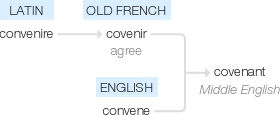Covenant
Middle English: from Old French, present participle of covenir ‘agree’, from Latin convenire (see convene).
wiktionary
From Middle English covenaunt, borrowed from Old French covenant(“agreement”), from Latin conveniēns, convenientem(“agreeing, agreeable, suitable, convenient”), present participle of conveniō(“to agree”). Cognate with convenient and convene.
etymonline
covenant (n.)
c. 1300, covenaunt, "mutual compact to do or not do something, a contract," from Old French covenant, convenant "agreement, pact, promise" (12c.), originally present participle of covenir "agree, meet," from Latin convenire "come together, unite; be suitable, agree," from com- "together" (see com-) + venire "to come," from a suffixed form of PIE root *gwa- "to go, come."
In law, "a promise made by deed" (late 14c.). Applied in Scripture to God's arrangements with man as a translation of Latin testamentum, Greek diatheke, both rendering Hebrew berith (though testament also is used for the same word in different places). Meaning "solemn agreement between members of a church" is from 1630s; specifically those of the Scottish Presbyterians in 1638 and 1643 (see covenanter).
covenant (v.)
"to enter into a formal agreement or contract," c. 1300, from covenant (n.). Related: Covenanted; covenanting. Also see covenanter.
